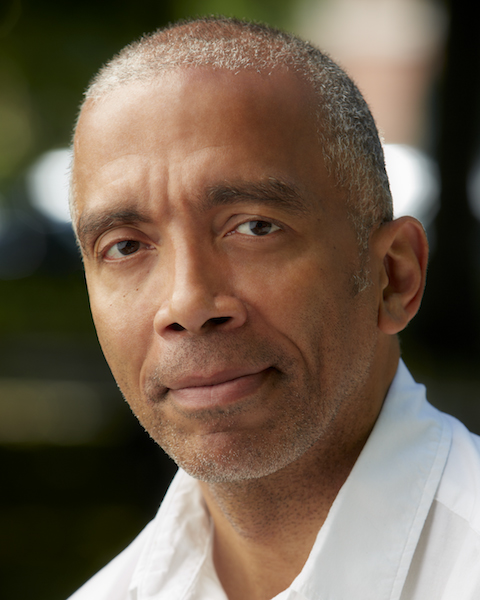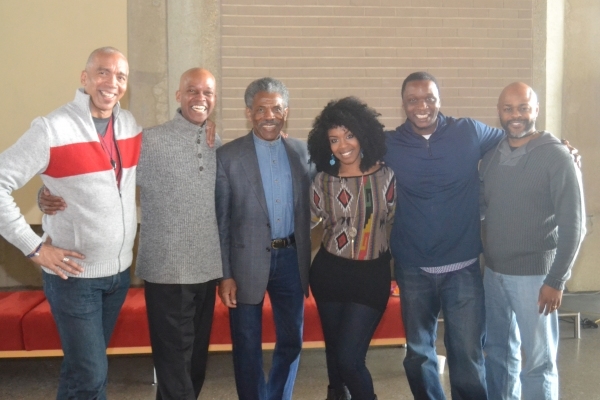Timothy Douglas Rediscovers August Wilson's King Hedley II for the Age of Obama
Douglas directs his eighth Pittsburgh Cycle play at Washington, D.C.’s Arena Stage.

Washington, D.C.'s Arena Stage is just a few days from opening its production of King Hedley II, the ninth installment in August Wilson's ten-part Pittsburgh Cycle. King Hedley II also happens to be the eighth Pittsburgh Cycle play for director Timothy Douglas, whose career as a Wilson aficionado has been an unexpectedly serendipitous journey.
"Directing was a career change for me," said Douglas. "I wasn't looking for it." Yet, it seems to have been chasing him down ever since his days at Yale Drama School where he watched Wilson develop his famous cycle of plays from inside the rehearsal room. Douglas shared some of his personal memories of the playwright as well as a few insights into the surprisingly contemporary relevance of his latest Wilson project. While the title ex-convict at the center of story finds himself firmly planted in a Reagan-omic world, the "King Hedley"s of today will tell you that social confines unfortunately transcend political regimes.
Why do you think August Wilson plays keep finding you?
There aren't that many African-American directors, and most theaters still honor August's original wish about only African-American directors [working on] his plays. But I [also] started my acting training at Yale Drama School the same year August came to Yale to begin the cycle. I understudied [in] the original Ma Rainey, Fences, and Joe Turner['s Come and Gone]. It just seemed to make sense that it came back to me — that that would be the thing I truly cut my teeth on as a director.
Do you feel like that experience gave you added insight into Wilson's plays that other directors may not have?
I saw the growth of August Wilson's writing. He didn't know that he was going to do a ten-play cycle until Joe Turner. I was around him when he came to that decision within himself. I watched the laser-like shift that happened with his writing. And [his] partnership with Lloyd Richards, Lloyd being a brilliant dramaturg to the early works. Those first drafts would come in and they were the size of phone books. It was Lloyd Richards side by side with August Wilson who really helped him shape what the published versions became.
What was Wilson like in the rehearsal room?
He loved telling stories — not just writing them down but orally. Working on Radio Golf, I [asked] him a direct question that I felt had to deal directly with a scene we were working on — and he says to me, "Tim, you look out on the ocean, you see a boat way out on the ocean, a big boat, and you know it's turning but you can't tell because [it’s] a big boat…It's almost imperceptible, but the boat is turning." What?! In my frustration in the moment, I was like I'm not gonna get anything out of this guy so I'll just fix it myself. And then just sitting and thinking about something else it hit me: That was the answer to the motivation for that character in that scene. He was answering my question! As a director, that gives me plenty of room to interpret, while still honoring exactly what he wants to have honored.
What do you think sets King Hedley II apart in his play cycle?
What I'm finding is in the age of Obama, it's as if there were all these hidden chambers inside King Hedley II that could not be unlocked until the times that we're living in now. [Not only] the age of Obama, but also this last year with Ferguson and Eric Garner and the protests — all Americans, not just black Americans, can hear things now that we couldn't hear when King Hedley was first performed.
So you feel like the play is more relevant now than it was in the eighties when it was first produced?
I think it's more relevant in terms of the plight of the King Hedley black men of the world: A man who's trying to do better and the structure of the system being so set against him. He comes to that clarity not from a whining place. He sees now what he has been swimming upstream against. And the other side of that coin is how he intuitively figures out how to work within that. Certainly by the letter of the law, there are times he is breaking the law. But when you look at the spirit of the man, you see this is the only way. He is just driven to do the right thing, which is not necessarily in agreement with what the law says. So it remains powerful on its own, and yet what the audience will bring to it is what's going to make it even more relevant.
You've directed eight of the ten plays in August Wilson's Pittsburgh Cycle. Which are the two that have eluded you so far?
Ma Rainey's Black Bottom and Seven Guitars.
Are they on your bucket list?
Funny you should phrase it that way. I have a superstition [about it]. The pros who have done all ten are no longer with us, so that last one I think I'm going to wait until I retire. [laughs] But on this [production], it's a dream come true to work with Andre DeShields. The very first professional/Broadway show that I ever saw was the original production of The Wiz. It was his performance that sort of smacked me upside my head and that was the seed that let me know that I was going to be in the theater for the rest of my life.

(courtesy of Arena Stage)








